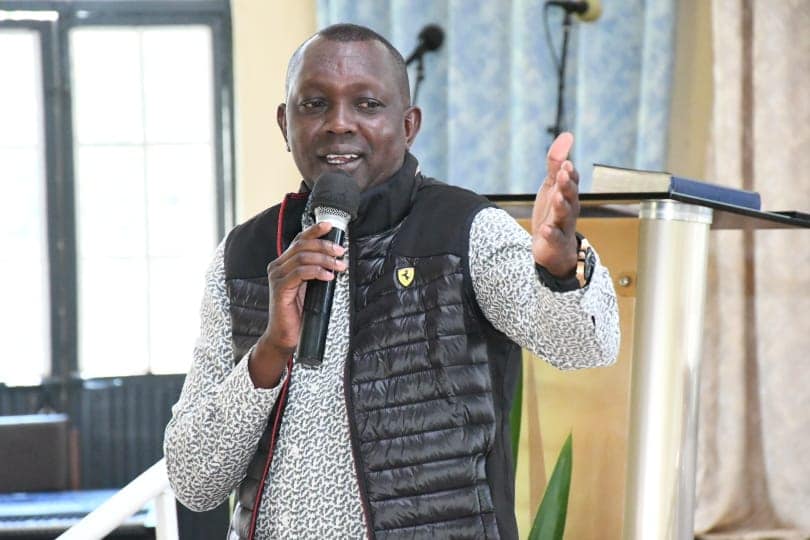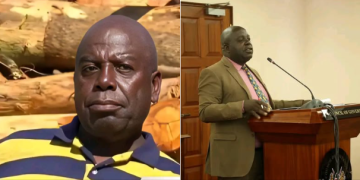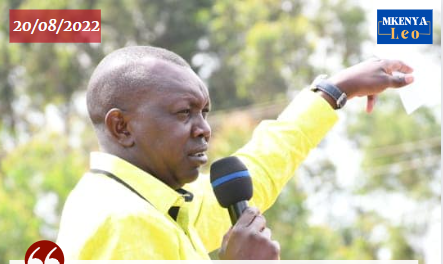Kapseret Member of Parliament Oscar Sudi has questioned the credibility of the four Independent Electoral and Boundaries Commission (IEBC) commissioners.
According to Oscar, the four namely Vice Chair Juliana Cherera and commissioners Francis Wanderi, Irene Masit, and Justus Nyang’aya were not qualified to serve at the commission.

Taking to his Facebook account, Oscar put himself in the same academic level with the four.
“I am still wondering how the four commissioners of IEBC led by Juliana Cherera were hired out of the 50M Kenyans. From the look of things, I think we belong to same league together with Cherera, three others, Joho, Junet and Gideon Moi in terms of academic background.”

Four IEBC commissioners who on Monday disowned the 2022 presidential results yesterday disclosed their reasons. But not without an arithmetic controversy to a political context that has already been treated to days of vote counting.
Independent Electoral and Boundaries Commission (IEBC) Vice Chairperson Juliana Cherera, Commissioners Francis Wanderi, Irene Masit, and Justus Nyang’aya listed four reasons for disowning the results in which William Ruto was declared President-elect by the Commission’s Chairperson Wafula Chebukati.
Cherera claimed Chebukati presented a “mathematical absurdity that defies logic”. She explained that the final tabulation of the four presidential candidates’ votes, in percentage terms, added up to 100.01 per cent.
According to Cherera, the 0.1 percentage points, a difference between 100.01 per cent and 100 per cent, translates to approximately 142,000 votes, which would have significantly impacted the final result.
IEBC official tally gave William Ruto 50.49 per cent while Raila Odinga got 48.85 per cent of the valid votes.
George Wajackoyah scored 0.44 per cent while David Mwaure got 0.23 per cent of the valid votes, according to the IEBC. The aggregation of IEBC’s percentages scored by the four candidates adds to 100.01 per cent, which Cherera faults as an absurdity.
How did IEBC arrive at the figures? First, they had to get the total votes scored by each candidate.
They then added the votes of all the four candidates to get the total valid votes. They ignored the spoilt votes since they are not used in calculating percentage of votes obtained by each candidate.
IEBC therefore divided the total votes of all the four candidates by the votes by each of them to get the respective percentages per candidate.
In five decimal places, the calculation gives Raila 48.84906 per cent while that of Ruto is 50.48989 per cent.
Mwaure gets 0.22505 percent and Wajackoya gets 0.43600 per cent, maintaining the five decimal places.
In five decimal places, the four add up to 100 per cent. But this can be presented in more than five decimal places or less.
IEBC chose to present in two, which for instance saw Raila’s percent become 48.85 per cent in line with mathematics rule of thumb when it comes to writing figures in a given number of decimal places. This explains the 100.01 per cent. We therefore rate as incorrect the claim that 100.01 percent is mathematical absurdity.
The claim that 0.01 per cent of the 14.2 million valid votes is approximately 142,000 votes is also incorrect.
The correct figure is 1,400, which is calculated as 0.01 out of 100 and the result multiplied by 14.2 million.
The 142,000 claimed by Cherera is equivalent to one percent of 14.2 million.










































